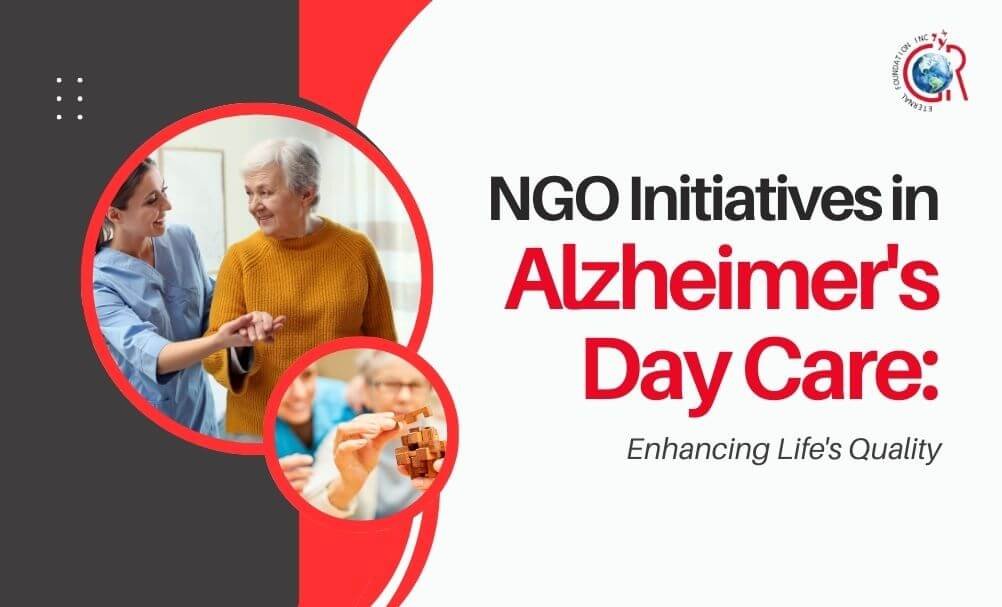
Alzheimer’s disease impacts millions of people all over the world, creating big challenges for those who have it and their families. As this illness gets worse, it becomes essential to have ongoing care. Non-governmental organizations (NGOs) are helping a lot by creating special Alzheimer’s daycare programs. These programs are critical because they improve the lives of people with Alzheimer’s.
They give help and support not just to the patients but also to their families who are affected by this challenging situation. This blog post looks at how NGOs are making a positive change in the area of Alzheimer’s day care. By offering day care services, these NGOs provide a safe and engaging place for patients, helping to relieve some of the stress and burden on their families.
Understanding Alzheimer’s Day Care
Alzheimer’s day care is for people with Alzheimer’s disease and other types of dementia. These programs allow people to do fun activities that are good for their brains, get health care, and spend time with others in a safe place during the day. This helps the caregivers because they can go to work or have time to relax from their hard job of caring for someone.
In Alzheimer’s day care, patients can do things like art, music, and simple exercises, which are all great for their health and happiness. They can also make friends and chat with others, which is suitable for their feelings. Plus, nurses and other health workers look after their medical needs. This means everyone can feel good knowing that the person with Alzheimer’s is safe, active, and cared for during the day. This kind of care is essential for both the patients and their families.
1. Tailored Activities for Cognitive Stimulation
One big help that Alzheimer’s day care centers provide is special activities that are good for the brain and can slow down the disease. These activities are made by experts and are chosen based on what each person likes and can do. For example, memory games, puzzles, and music therapy are popular because they keep the mind active and help people interact with others. These activities make sure that people with Alzheimer’s stay as sharp as they can and enjoy time with friends.
NGOs that run these day care centers are also creative with their technology use. Some centers have virtual reality systems. These can give patients special exercises to help their memory or create peaceful places for those who might feel upset or stressed. This mix of fun activities and high-tech tools makes Alzheimer’s day care an excellent support for people with this disease. It helps them feel better and gives their families peace of mind, knowing their loved ones are in good hands.
2. Specialized Health Care Services
Alzheimer’s day care centers do a lot to help people with Alzheimer’s disease. Besides activities that are good for the brain and making friends, these centers also take care of each person’s health. They check on patients regularly to see how their health is doing, give them their medicines, and quickly deal with any problems related to Alzheimer’s.
NGOs work with doctors and nurses to make sure they meet the health needs of Alzheimer’s patients well and quickly. These health professionals regularly check on the patients, which helps them update their care plans when the disease changes. This means every patient gets care that is just right for them.
By providing health services and fun activities, Alzheimer’s day care centers help patients feel better and stay as healthy as possible. This makes these centers a significant place for people with Alzheimer’s, giving them the care and support they need every day.
3. Support and Respite for Families
Families who care for someone with Alzheimer’s often feel a lot of stress, which can lead to caregiver burnout. Alzheimer’s day care centers are very important because they give these families a break. While the patients spend time in a safe and fun place, caregivers can take care of their own needs, go to work, or just rest.
Many NGOs also provide support groups and teach families about Alzheimer’s through educational sessions. These help families understand the disease better and learn how to handle daily challenges. These resources are precious. They give families the information and support they need to manage their caregiving duties better. Alzheimer’s day care centers not only help the patients but also support the families, making it a little easier for them to cope with the challenges of Alzheimer’s disease.
4. Creating a Community of Care
NGOs play a crucial role in building a community for Alzheimer’s care. Alzheimer’s day care centers are more than just places to look after patients; they are communities where patients and their families can meet others in similar situations. This community feeling is significant because it helps fight the loneliness that people with Alzheimer’s and their caregivers often feel.
NGOs create a support network by setting up social events and community programs. These activities encourage patients, families, and caregivers to talk to each other and share what they are going through. This sharing can make everyone feel less alone and more supported.
It’s about providing care and creating a space where everyone involved in Alzheimer’s care can feel part of a larger community. This sense of belonging can make a big difference in those affected by Alzheimer’s, providing comfort and understanding in their journey.
5. Advocacy and Awareness
Besides giving direct care, NGOs are critical in helping people understand more about Alzheimer’s disease and fighting for better policies. On special days like World Alzheimer’s Day, these organizations start extensive campaigns. They tell people all about Alzheimer’s, push for new rules that could help people with the disease, and support research that looks for better ways to care for and treat Alzheimer’s.
These actions are beneficial because they make more people aware of Alzheimer’s and how it affects lives. They also work hard to make changes that could make life better for people with Alzheimer’s and their families. By doing this, NGOs help everyone understand and care about Alzheimer’s, not just the people who directly deal with it daily.
Conclusion
NGOs are leading the way in improving the lives of Alzheimer’s patients with their special day care programs. These programs provide important brain exercises, health care, and emotional support in a well-organized environment.
This helps a lot, not just for the patients but also for their families. As more and more people get Alzheimer’s, the work of these NGOs is becoming even more important. They bring hope and help to those dealing with this tough disease.
Alzheimer’s day care centers are more than places that care for people; they are centers of new ideas and support in the community. They aim to improve the lives of people with Alzheimer’s and their families. If you or someone you know needs this help, contacting a local NGO is a good first step. They can offer kind, expert care for loved ones with Alzheimer’s, helping make their lives and families a little easier.
